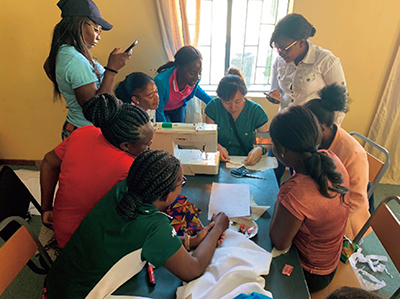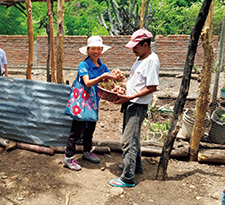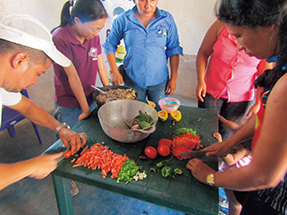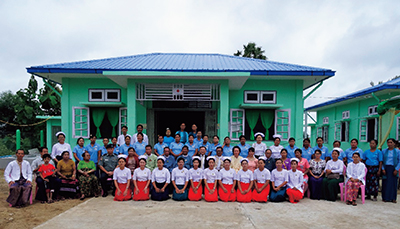(2) Partnerships for Civil Participation with Japan Overseas Cooperation Volunteers, NGOs, and Other Partners
A. Japan Overseas Cooperation Volunteers (JICA Volunteer Program)

A JOCV teaching clothes-making to students in Ondangwa, Namibia (Photo: JICA)
The JICA Volunteer Program, including the Japan Overseas Cooperation Volunteers (JOCVs), started in 1965 and has been delivering results for more than half a century. More than 50,000 volunteers have been dispatched to 98 developing countries and regions in total, contributing to the development of these countries and regions and embodying the “visibility of Japanese development cooperation.” The program entails public participation. Volunteers receive 70 days of training. Then they are dispatched to developing countries in principle for two years to assist economic and social development in the countries, while living and working with the local communities.
The JICA Volunteer Program is highly regarded both domestically and internationally. The program contributes not only to the economic and social development of developing countries and regions, but also to promoting mutual understanding and friendship between Japan and these countries and regions through the deepening of local people’s affinity for Japan. Moreover, the program is drawing attention in the respect that ex-volunteers utilize their experiences and knowledge to give back to Japanese society. For example, ex-volunteers who have obtained global views through the program are contributing to local revitalization in Japan and the business expansion of Japanese private companies to developing countries (see the glossary for details on “Japan Overseas Cooperation Volunteers (Private Sector Partnership)”).
In order to promote these initiatives, the Government of Japan has been striving to make it easier for more people to join the program through supporting ex-volunteers in developing their careers, as well as disseminating information on how to participate in the program while retaining one’s job.
Both the spring selection process and the autumn recruitment in FY2020 were cancelled due to the COVID-19 pandemic. Recruitment for FY2021 will be held depending on the infection situation (see Part I for COVID-19 Pandemic and Japan’s Efforts).
The JICA Volunteer Program was revised to classify volunteers not by the age category (youth/senior), but by whether or not the contents of the work require a certain level of experience and skills. These changes have been introduced starting with the autumn recruitment in 2018.
Honduras
Project for Promoting Home Gardening toward Nutrition Improvement in the Municipality of Vado Ancho in the department of El Paraiso
JICA Partnership Program (JPP) (Partner Type) (August 2017 – December 2019)

An AMDA-MINDS project coordinator checking the vegetables grown by a local resident in a home garden (Photo: AMDA-MINDS)

A cooking class using vegetables harvested from home gardens (Photo: AMDA-MINDS)
The Municipality of Vado Ancho in the department of El Paraiso, located in the arid zone of Honduras, is one of the poorest municipalities in the country. Most local people make a living by growing corn and beans. However, since 2014, droughts have been getting longer year after year, resulting in crop failure. This then led to local people being provided with food aid from the government and international organizations. In addition, because of the limited variety of vegetables available for purchase, the local people have been living on a nutritionally unbalanced diet.
In order to resolve these problems, JICA and AMDA Multisectoral and Integrated Development Services (AMDA-MINDS), a Japanese NGO, promoted home gardening in the Municipality of Vado Ancho through the JICA Partnership Program, which aimed to increase food production that considers the nutritional value of the foods consumed by local people. Specifically, they worked with local NGOs to provide the local people with hands-on training and technical education on home gardening using as little chemical fertilizer as possible, as well as cooking classes using the harvested crops.
As a result of these efforts, 182 households are now practicing home gardening, which is higher than the original target of 120 households, and the number of crop varieties grown by each household has increased by 24 on average compared to when the project started. Furthermore, other results, such as holding open-air markets to sell harvested crops locally, have been seen. The number of home gardens are still growing, even after the completion of the project.
B. Cooperation with Japanese NGOs
Japanese NGOs implement high-quality development cooperation activities in various fields in developing countries and regions. Even in sites affected by conflict or natural disasters, such as earthquakes and typhoons, they have been providing prompt and effective emergency humanitarian assistance. NGOs are attuned to different local situations in developing countries and are capable of carefully tailoring responses to the needs of the local people. Accordingly, NGOs can provide assistance even at the grassroots level, which can be hard-to-reach through the support of the government and international organizations. The MOFA positions Japanese NGOs that carry out activities, which represent the “visibility of development cooperation,” as indispensable partners in development cooperation. It also promotes collaboration with them through the three pillars of assistance, including financial cooperation (see below), support for the creation of an enabling environment for their activities, and dialogues with them.
In addition, under the Development Cooperation Charter, MOFA and NGOs jointly developed a plan outlining the direction of their collaboration for the next five years and announced it in 2015. Furthermore, MOFA has been following up on this plan, releasing an annual progress report on the joint plan together with NGOs.
... Funding Assistance for NGOs
The Government of Japan has been cooperating in various ways to enable Japanese NGOs to smoothly and effectively implement development cooperation and emergency humanitarian assistance projects in developing countries and regions.
■ Grant Assistance for Japanese NGO Projects

Completion of a health sub-center in Tatkon Township, Myanmar (Photo: People’s Hope Japan)
MOFA provides financial support for the socio-economic development projects that Japanese NGOs implement in developing countries through the Grant Assistance for Japanese NGO Projects. There is a wide range of fields in which the projects are implemented, such as health and medical care, education and human resources development, vocational training, rural development, water resource development, and human resources development for landmine and unexploded ordnance (UXO) removal. In FY2019, 62 Japanese NGOs utilized this scheme to implement 113 projects in 32 countries and 1 region, amounting to approximately ¥5.59 billion (see also Assistance from Japan Utilized in the COVID-19 Crisis, the column “Timor-Leste ”, and the column “Nepal ”).
Based on the recommendations made by the Advisory Board for ODA, which held a total of four sessions in 2018, MOFA raised the ratio of general administrative expenses in April 2019 from what was formerly 5% of local project expenses to a maximum of 15% within the Grant Assistance for Japanese NGO Projects. This enabled NGOs to allocate their own funds, which were previously used to cover the funding gap in implementing ODA projects, to strengthen their organization through activities in such fields as public relations and fundraising. It is expected that this will strengthen the financial foundation and organizational capacity of NGOs and increase their recognition as a key player in implementing ODA projects both within Japan and abroad.
■ Japan Platform (JPF)
Japan Platform (JPF), an emergency humanitarian aid organization, was established in 2000 through a partnership among NGOs, the government, and the business community. As of October 2020, JPF has 44 member NGOs. JPF utilizes ODA funds provided by MOFA, as well as donations from companies and citizens to carry out emergency humanitarian assistance, including through the distribution of food/non-food items and livelihood recovery support, when a large-scale natural disaster occurs or a vast number of refugees flee from conflicts. In FY2019, JPF implemented 106 projects under 12 programs, including assistance for the humanitarian crises that occurred in Afghanistan, Yemen, Iraq, and Syria, humanitarian assistance in Gaza Strip in Palestine, emergency assistance for refugees from South Sudan, humanitarian assistance for displaced persons from Myanmar, assistance for people affected by floods and landslides in Nepal, assistance for people affected by cyclones in Southern African countries, and assistance for displaced persons from Venezuela (see also Part I for response to the COVID-19 pandemic though JPF and Support for Refugees and Displaced Persons for assistance for refugees and displaced persons).
■ NGO Project Subsidies
In FY2019, MOFA provided NGO project subsidies to six Japanese NGOs conducting such activities as project identification and formulation, post-project evaluations, and seminars and workshops in Japan and overseas for development cooperation projects.
■ JICA Partnership Program (JPP)
JICA Partnership Program (JPP) is a joint project outsourced by JICA to Japanese NGOs/CSOs, local governments, universities, private enterprises, and other organizations willing to engage in international cooperation. Proposals are submitted to JICA for international cooperation activities based on their accumulated knowledge and experience and implemented by these partners in collaboration with JICA (see the JICA website Note 8 for information on program details and application procedures among others). Through the JICA Partnership Program, approximately 200 projects are implemented in approximately 90 countries every year.
... Support for Establishing a Better Environment for NGOs Activities
In response to the growing importance of non-government actors and the use of private funding other than ODA in international cooperation, MOFA carries out the following programs with the objective of further strengthening the organizational structures and project implementation capabilities of Japanese NGOs and developing their human resources.
■ NGO Consultant Scheme
Under this scheme, MOFA commissions highly experienced Japanese NGOs (15 organizations in FY2019) to address inquiries and respond to requests for consultation from citizens and NGOs on such topics as international cooperation activities by NGOs, how to establish an NGO, organizational management and operation, and approaches for providing development education.
■ NGO Internship Program/NGO Study Program
MOFA implements the NGO Internship Program and NGO Study Program with the objective of strengthening the organization through human resources development. The NGO Internship Program aims to develop human resources to enable young people to play an active role in Japanese NGOs for international cooperation in the future. A total of nine interns were accepted by NGOs through this program in FY2019.
Under the NGO Study Program, mid-career personnel from Japanese NGOs for international cooperation undergo domestic and overseas training and widely share the fruits of their training within their organization and with other NGOs, with the aim of contributing to enhancing the capabilities of Japanese NGOs as a whole. In FY2019, nine people received training through this program.
■ NGO Study Groups
NGO study groups aim to strengthen NGOs and their capacities by conducting joint studies and research, seminars, workshops, symposiums, and other activities regarding common issues faced by NGOs and reporting and recommending specific measures for improvement. In FY2019, NGO study groups were held on the following three themes: (i) “Survey on the Status of Organizations and Activities of NGOs and CSOs in Japan,” (ii) “Strengthening the Capabilities of Japanese NGOs Engaged in International Cooperation: Lessons Learnt from Disaster Prevention and Relief Activities within the Japanese Borders,” and (iii) “Recommendations for Promoting Safeguarding and Development of its Guidelines for Japanese NGOs in the International Cooperation Sector.” The reports and outcomes of these activities are available on the ODA website of MOFA.
... Dialogue with NGO (NGO-Ministry of Foreign Affairs Regular Consultation Meetings, NGO-Embassies ODA Consultation Meeting, and NGO-JICA Consultation Meeting)
In order to promote a stronger partnership and dialogue between NGOs and MOFA, the NGO-Ministry of Foreign Affairs Regular Consultation Meeting was launched in FY1996 for sharing information on ODA and regularly exchanging opinions on measures for improving partnerships with NGOs. In FY2019, in addition to the General Meeting, two subcommittees, the “ODA Policy Council” and the “Partnership Promotion Committee,” convened meetings twice respectively (see the MOFA website Note 9 for more information on the NGO-Ministry of Foreign Affairs Regular Consultation Meeting, meeting minutes, and other details).
In addition, since 2002, in order to promote dialogue and strengthen cooperation with Japanese NGOs in Japan and abroad, embassy officials, JICA, and NGO personnel involved in ODA have been exchanging views at the NGO-Embassies ODA Consultation Meeting with the aim of promoting “visibility of development cooperation” through an all-Japan approach toward the effective and efficient implementation of ODA.
Based on equal partnership with NGOs, JICA holds meetings including the NGO-JICA Consultation Meeting and NGO-JICA Study Sessions to promote the realization of more effective international cooperation, as well as public understanding and participation in international cooperation.
